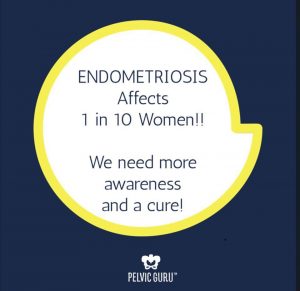WHAT? Pelvic Floor Physiotherapy and KIDS?
Pelvic floor physiotherapy is not just for adults. Even our little people have pelvic floors, and they do have issues with those pint-sized pelvic floors sometimes.
Ok sure, but what could they need help with exactly?
Pediatric Pelvic Floor refers to children under the age of 18. So we are looking at a wide variety of issues that can be addressed with pelvic floor physio.
- Daytime Leaking (“Accidents”): leakage of urine in inappropriate places over the age of 5 can occur during the day and at night
- Bed wetting (Nocturnal Enuresis): leakage of urine at night WITHOUT daytime symptoms or issues
- Constipation: stools that are often infrequent and hard to pass (but did you know you can be constipated and still poop every day?!)
- Poop Accidents (Encopresis): leakage of stool in inappropriate places
What should I be watching for?
If your child is having issues with any of the above, they may benefit from pelvic floor physiotherapy for kids. One of the biggest contributing factors to ALL of the issues listed above, is constipation itself.

How does constipation affect day time wetting, bed wetting, and poop accidents?
When we are constipated (and this is true of adults as well), our rectum stretches and stores stool instead of emptying fully. This stretching eventually leads the stored stool in the rectum to put pressure on the bladder. This irritates the bladder leading to increased trips to the bathroom, and accidents throughout the day. This same pressure is what can cause night time wetting; essentially the poop takes up so much space the bladder just has to void.
If a child is constipated they can’t have poop accidents though, right?
FALSE! Depending on how long this has been going on, the child may also still poop regularly. There are a couple ways poop accidents can happen.
As the colon is stretched, the normal receptors in the bowel that signal your brain that you need to poop don’t work as well, similar to a deflated balloon. The receptors need to be stretched against tension to work well. As your bowel collects and stores stool in the stretched out colon, you become constipated. But, softer liquid stool can sneak around the hard stool (this is called bypass). Sometimes people think their child has diarrhea when they see bypass and the idea that they are constipated seems far-fetched, but it’s true!
This can happen in young children, pre-teens, and teenagers. The longer constipation goes undiagnosed/treated, often the harder it is to resolve.
What does Pelvic Floor Physio for kids look like?
We require a parent or guardian to be present at all appointments with children for pediatric pelvic floor therapy.  At the first appointment we will take a detailed history including potty learning statistics, diet, bathroom habits, social impact, among other things. We will also take a look at movement, strength, stability, and we usually do some sort of abdominal exam. Many children that are having issues have been poked, prodded, and had some scary procedures done, so at physio my goal is to make it fun, engaging, and not painful whenever possible. But this isn’t enough, we also need to make it something important for the child as well!
At the first appointment we will take a detailed history including potty learning statistics, diet, bathroom habits, social impact, among other things. We will also take a look at movement, strength, stability, and we usually do some sort of abdominal exam. Many children that are having issues have been poked, prodded, and had some scary procedures done, so at physio my goal is to make it fun, engaging, and not painful whenever possible. But this isn’t enough, we also need to make it something important for the child as well!
Giving them things that they can do to take ownership, and see change in – like a poop and pee diary – is very important. Ensuring that we are celebrating the successes, and down-playing the misses is also crucial.
Why is it important to address pelvic floor issues in childhood?
Clinically, we see a possible correlation between adult pelvic floor dysfunction and childhood issues. In the population of clients seen for pelvic pain conditions as adults (dyspareunia, vulvodynia), there is often a history of constipation and childhood toileting issues. Adults that have increased voiding frequency, urge incontinence, and a ‘weak bladder’ often speak of pre-teen and teenage issues as well.
What can I do?
Start out right, keep poop mushy, a peanut butter or hummus consistency is key. Often kids will start solids and become constipated, some will have one instance of constipation and have difficulty because they are scared of being painful (which leads to a vicious cycle). If your child has a history of straining, large stools (the whoa that might clog the toilet ones), works hard to get stool out, has poop ‘stains’ on their underwear, or has had multiple days without passing a stool, constipation could be an issue.
Regardless of how it starts, pelvic floor dysfunction in children can and should be attended to by a qualified physical therapist.

 Haylie has been practicing women’s health and focused in prenatal and post-partum care since graduating from the U of S MPT program in 2011. Adding to her practice pediatric pelvic floor therapy in 2017. She has been advocating for treatment for women, ensuring appropriate and effective care throughout pregnancy and post-partum, and helping all expecting and post-partum moms brought her to open her family-friendly clinic; where clients are encouraged to bring their infants and children to treatment. Adding pediatric pelvic floor. Warman Physiotherapy & Wellness has been nominated for the 2018 WMBEXA, is a WMBEXA award recipient of 2017, and a finalist in the ABEX 2017, and Haylie was recognized as YWCA Women of Distinction for Health & Wellness in 2017.
Haylie has been practicing women’s health and focused in prenatal and post-partum care since graduating from the U of S MPT program in 2011. Adding to her practice pediatric pelvic floor therapy in 2017. She has been advocating for treatment for women, ensuring appropriate and effective care throughout pregnancy and post-partum, and helping all expecting and post-partum moms brought her to open her family-friendly clinic; where clients are encouraged to bring their infants and children to treatment. Adding pediatric pelvic floor. Warman Physiotherapy & Wellness has been nominated for the 2018 WMBEXA, is a WMBEXA award recipient of 2017, and a finalist in the ABEX 2017, and Haylie was recognized as YWCA Women of Distinction for Health & Wellness in 2017.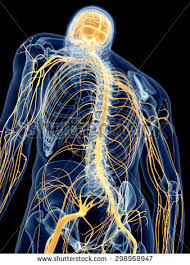 Globally with pain science, one of the most important things to understand are there are no pain signals to the brain. The brain receives information from the body, and depending on what all those signals are saying, will determine if something is painful or not. Have you ever stubbed your toe when you are having a great day? It hurts SO MUCH. But, if you stub your toe while you are in the middle of an argument with someone, it doesn’t hurt the same; that’s pain science!
Globally with pain science, one of the most important things to understand are there are no pain signals to the brain. The brain receives information from the body, and depending on what all those signals are saying, will determine if something is painful or not. Have you ever stubbed your toe when you are having a great day? It hurts SO MUCH. But, if you stub your toe while you are in the middle of an argument with someone, it doesn’t hurt the same; that’s pain science!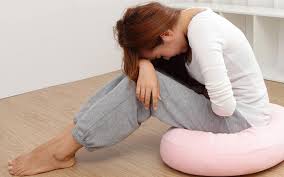
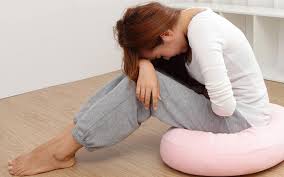 Thankfully, I was put on birth control, which seemed to make my periods manageable. My actual diagnosis of endometriosis was not until Oct of 2017. 6 Months prior to this I started developing excruciating stabbing pains in my right lower abdomen. A walk in doctor triaged me to the emergency room thinking my appendix had ruptured. Blood work showed no signs of infection, IV pain meds were given and an x-ray image did not show anything concerning. I was sent home with pain meds and told that I needed to poop. Exactly one month later (a month between my period) I ended up in excruciating pains where once again I ended up in the emergency room. This ER doctor again thought for sure it was my appendix but this time ordered an ultrasound. The ultrasound showed a 4cm hemorrhagic cyst on my right ovary. I was sent home with pain meds, and another ultrasound requisition. I was told to go see my family doctor in 6 weeks. I was told that a hemorrhagic cyst is nothing to worry about that it can happen with ovulation. My anatomy background and my knowledge of how a body works from also being a vet tech gave me a feeling that
Thankfully, I was put on birth control, which seemed to make my periods manageable. My actual diagnosis of endometriosis was not until Oct of 2017. 6 Months prior to this I started developing excruciating stabbing pains in my right lower abdomen. A walk in doctor triaged me to the emergency room thinking my appendix had ruptured. Blood work showed no signs of infection, IV pain meds were given and an x-ray image did not show anything concerning. I was sent home with pain meds and told that I needed to poop. Exactly one month later (a month between my period) I ended up in excruciating pains where once again I ended up in the emergency room. This ER doctor again thought for sure it was my appendix but this time ordered an ultrasound. The ultrasound showed a 4cm hemorrhagic cyst on my right ovary. I was sent home with pain meds, and another ultrasound requisition. I was told to go see my family doctor in 6 weeks. I was told that a hemorrhagic cyst is nothing to worry about that it can happen with ovulation. My anatomy background and my knowledge of how a body works from also being a vet tech gave me a feeling that 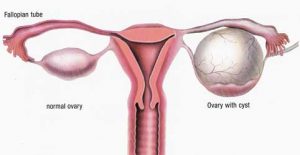 something more was wrong. The pain experienced during this time nearly made me pass out. Breathing hurt so I would hold my breath. I knew something wasn’t right. A 2nd ultrasound 30 hrs later showed that my cyst had grown by a couple of centimeters but that the radiologist wasn’t concerned as it’s just a hemorrhagic cyst and they can happen during ovulation. I wasn’t ovulating, I was at the end of my period. Something wasn’t right.
something more was wrong. The pain experienced during this time nearly made me pass out. Breathing hurt so I would hold my breath. I knew something wasn’t right. A 2nd ultrasound 30 hrs later showed that my cyst had grown by a couple of centimeters but that the radiologist wasn’t concerned as it’s just a hemorrhagic cyst and they can happen during ovulation. I wasn’t ovulating, I was at the end of my period. Something wasn’t right.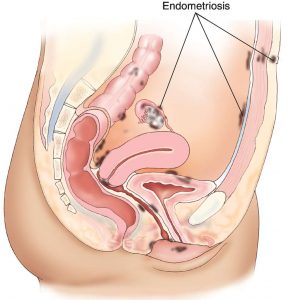 I had honestly never heard of it before. I went home that night and did what most people do– I took to google. Symptoms of this disease was pelvic pain, which I did have prior to these episodes but chalked it up to the many bladder infections that I’ve suffered from. Extremely painful periods was another symptom, which again I had when I was not on birth control. Surely, this disease couldn’t have started at the age of 16. I kept reading, “many women with endometriosis suffer from infertility.” 2 years prior, I had a beautiful baby girl so I couldn’t much relate to that. Back pain can also be a sign of endometriosis. Sure, my back hurt, but I had also been diagnosed with scoliosis of my spine years earlier so my back pain was from that. “The feeling of your insides being pulled down”. My gynecologist asked me during one of my appointments how I was feeling. I told her “it’s like I’ve eaten Chinese food for all 3 meals a day. Like my guts are just so heavy they are all hanging below my belly button.”
I had honestly never heard of it before. I went home that night and did what most people do– I took to google. Symptoms of this disease was pelvic pain, which I did have prior to these episodes but chalked it up to the many bladder infections that I’ve suffered from. Extremely painful periods was another symptom, which again I had when I was not on birth control. Surely, this disease couldn’t have started at the age of 16. I kept reading, “many women with endometriosis suffer from infertility.” 2 years prior, I had a beautiful baby girl so I couldn’t much relate to that. Back pain can also be a sign of endometriosis. Sure, my back hurt, but I had also been diagnosed with scoliosis of my spine years earlier so my back pain was from that. “The feeling of your insides being pulled down”. My gynecologist asked me during one of my appointments how I was feeling. I told her “it’s like I’ve eaten Chinese food for all 3 meals a day. Like my guts are just so heavy they are all hanging below my belly button.”